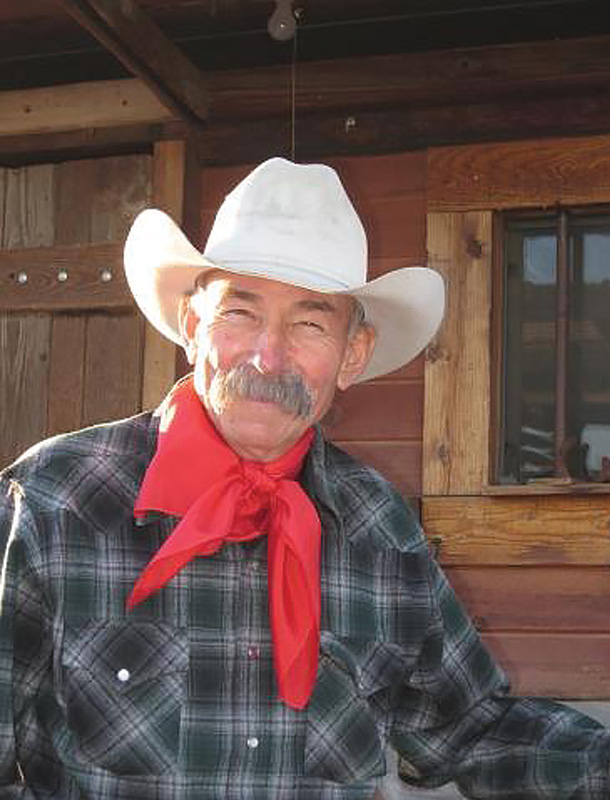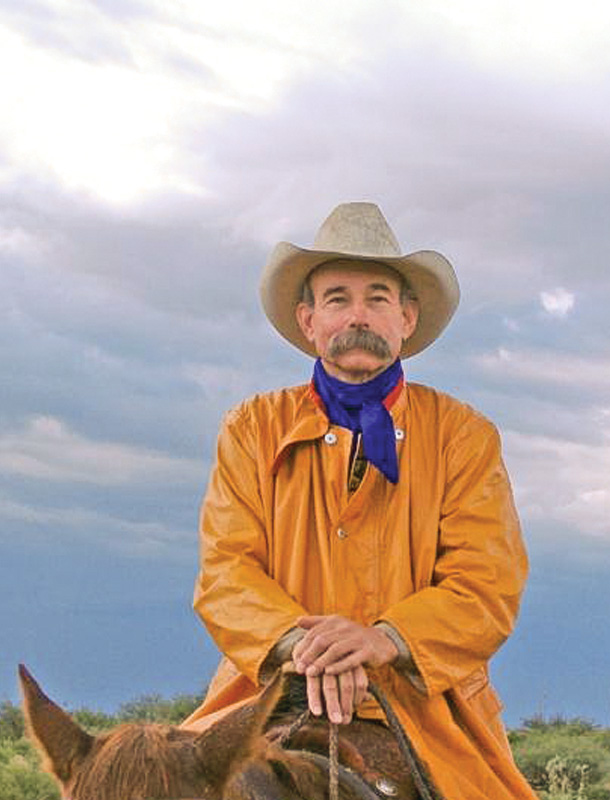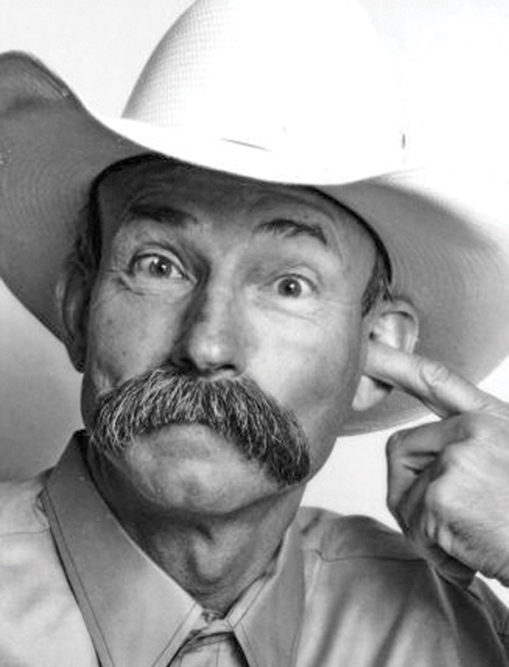This past fall we learned that Baxter Black, poet, author, columnist, veterinarian, star of radio and YouTube, podcaster, profound stage performer and spokesman for the haggard but tireless cattle producer, is hanging up his spurs and putting away the saddle. A well-earned retirement has begun for a writer beloved across the agricultural hemisphere.
Baxter’s On the Edge of Common Sense column has been in Progressive publications since 1987 when Progressive Dairy magazine began. There is no replacing a man of such talents and personality. We love him and will miss his contributions. The body of work from this mustachioed virtuoso speaks for itself.
Progressive Publishing staff members share some of their favorite pieces from Baxter and his craftsmanlike style to describe life on the farm.
 Leon Leavitt
Leon Leavitt
Publisher Emeritus
Within the first year of producing Progressive Dairy magazine, 1987, we heard of Baxter Black and contracted his column to be included in our publication. We have enjoyed that association now for 34 years, and it’s been an exciting, wonderful adventure.
A few years later I had the blessing of meeting Baxter at an event in western Idaho where he was the featured entertainer. And what a fun time that was as I about split a gut laughing so hard at his outrageously hilarious commentary related to cows, dogs, fences, cowboys, veterinarians, feed salesmen - really anything to do with the farming environment that I was raised in.
He held the audience in suspense as one-liner after another flowed from his lips. His quick wit coupled with an often dead-panned expression on his face enthralled all in attendance. We loved it. I believe his calling in the next life will be no different. He will be there to encourage, to uplift, to help others by easing their burdens, especially to think better of themselves and to go forward with optimism and a cheery heart. We will miss you, Baxter, but you will never be forgotten.

 Walt Cooley
Walt Cooley
Editor-in-chief
Progressive Dairy
I met Baxter Black early in my career when he stopped in our Idaho office for a visit while passing through for other business. Baxter in every sense of the word is a prolific writer. The ability to write and create content for as many years as he has is amazing. He’s certainly at the top of the publishing world as a continuously publishing author.
My favorite Baxter Black content is his definition for a friend. I clipped the definition he wrote in 2014 and have used it often since. Here’s how he defined friendship:
Friend is a word that
I don’t throw around
Though it’s used and abused,
I still like the sound.
I save it for people
who’ve done right by me
And I know I can count on
if ever need be.
Baxter, you’ve always done right by us. Around here we call you a friend.
To read the rest:
Link: On the Edge of Common Sense: Take care of yer friends
 Carrie Veselka
Carrie Veselka
Newsletter editor
Progressive Dairy
I have never had the privilege of meeting Baxter Black in person, although I have glimpsed him from afar at several cattle industry events, surrounded by a bevy of admirers. Baxter’s columns and other works never fail to entertain and uplift. He is one of those special people who could make a joke at your expense or insult you to your face and make it feel like a compliment – and at least 95% of the time, it really would be one. He also saves himself from getting tossed out of the pickup bed spurs-first by keeping things balanced with plenty of self-deprecating wit.
An excellent example of this trait and one of my favorite Baxter columns is “Remains of a party (from the archives of Baxter’s former life)” In this column, he recounts an evening of drunken revelry that, for one of the participants, can only seem funny after the hangover has run its course. For us readers, it’s entertaining from start to finish, describing the quintessential version of every country folks’ get-together, complete with the fundamental elements of music, booze and a little horse trading, all encapsulated in a pithy 600 words. It begins, “I had a party. It lasted 48 hours. I lost my socks, my dignity, two days of my life, six ping-pong balls and four pounds” and just gets better from there. You will be missed, Baxter.
Link: On the Edge of Common Sense: Remains of a party (from the archives of Baxter's former life)
 Cassidy Woolsey
Cassidy Woolsey
Editor
Progressive Cattle
It could be that my dog has brought home a few things we’ve had to sheepishly return to a neighbor or the fact he decorates my yard on occasion with remnants of my husband’s rodent kills and any other furry corpses that lay to rest in our neighboring fields. Whatever the case, "The dog and the rabbit" (December 2017) will forever be a favorite in my home.
I can’t even look at a Holiday Inn without letting out a little chuckle. This is Baxter’s wordsmithery at its finest.
The dog and the rabbit
Have you ever been embarrassed by your good dog? Me either. I’ve got a good dog. An Australian shepherd with one blue eye, and I believe he loves me. I believe I love him. He’ll go with me anywhere.
When I say, “You wanna go?” He don’t ask, “Where you goin’? Goin’ to the game store?” No, he don’t care; he just wants to go.
And did you ever notice it don’t matter whether you’ve been gone five minutes or five days, your dog is so glad to see you. Can you think of a single human being that glad to see you? You’re fixin’ to leave, walk out to the pickup and forget somethin’, so you run back inside. Your dog licks your hand. Your spouse says, “I thought you left.”
I’ve got a neighbor. A good neighbor. And when you live on the outskirts, a good neighbor is someone who lives just the right distance away. Close enough to circle the wagons but far enough away to allow that privacy people like us seem to value. (“I believe those are Kansas plates, mother,” he said, sighting through his binoculars.)
Anyway, she gets home about a quarter after five every day. Goes through the house and comes out the back door wearin’ her coveralls. In her backyard, she has a long line of rabbit hutches and she spends what is to me an inordinate amount of time messin’ with them rabbits … talkin’ to ’em … singin’ ’em little rabbit songs.
Now I’m sittin’ out on the back porch one afternoon in my porch swing. It’s about 2:30. I’m done workin’. I’ve already thought up somethin’. I look out in the driveway, and there’s my good dog and he has got a … and you know how you can tell it ain’t a jackrabbit?
They aren’t black and white, they don’t have them big floppy ears, and he has got this rabbit between his teeth and he’s thrashin’ him like a shark with a hamhock. There’s dirt and leaves and brush and gravel flyin’ all over. I jumped up and grabbed that rabbit. “Go git in the pickup, you *#@^...!” That rabbit looked bad. Looked like he caught on fire and somebody put him out with the weed eater.
To read the rest:
Link: On the Edge of Common Sense: The dog and the rabbit

 David Cooper
David Cooper
Editor-in-chief
Progressive Cattle
Baxter Black has mastered performance in a way old Shakespearean actors never could. “Dying is easy,” they would say of difficult scenes, “but comedy is hard.”
Not so for Baxter. Humor is the path to enlightenment. If a rancher can’t laugh through storms, cattle wrecks, three-wheeled pickups or conversations (real or imagined) with the barnyard animals, he’d best go on permanent vacation.
There are notable exceptions to the laughter. Take Baxter’s account of preg-check days in “That time again” (October 2018). It’s culling season and the crew is ready to decide: Who’s stayin’ and who’s goin’ to town?
Leave it to Baxter to teach what all cattlemen know: Comedy really is easy; it’s dying that’s hard.
The open cow … You know they are in the bunch. And you can bet your hired help, your neighbors and your family will all be lookin’ over your shoulder, anxious to see your decision. They will be full of advice. But, in the end, whether you keep that open cow or not will be strictly between you and her.
Say she bangs into the chute. Her teeth are good, she’s fat, 5 years old and just weaned a 550-pound calf. The vet shouts “Open!” The vaccinators are poised, waiting for your decision. You rapidly calculate that open cow will bring $880 at the sale Wednesday.
You dither, remembering her first calf. You had to pull it. It was a cold night in February. The two of you spent four hours in the shed gettin’ that calf to suck. Once he was goin’, she took ’im and never looked back. Dang, you hate to see her go. You bite the bullet … “Cull her,” you say, but you can’t look her in the eye.
In comes a first-calf heifer. Sorta thin, not full-grown. She’s showin’ some potential but, when the preg checker calls out “Open,” you realize she won’t have a calf next spring. If she settles, she’ll wean her second calf 24 months from today. That’s a long time to hold your inventory. “Cull ’er,” you say. Wow! Yer feelin’ like a businessman.
In the last chute load, an old redneck mama comes through. You recognize her. When the boy punches her with the hot shot, you wince. Popcorn teeth, hollow flanks and a scruffy tailhead. Her bag hangs like a four-dollar drape. She raised a big strappin’ calf this year, but it took all she had.
She was in the first bunch of heifers you bought when you took over the ranch 12 years ago. She put you over the fence a time or two, but now she doesn’t seem to care. Too old, too wore out. “Open,” comes the intrusion.
The silence is heavy. Your eyes travel down her spine and back to her lifeless eyes. “Run ’er one more year. She’ll die on this place.” Nobody says a word.
Link: On the Edge of Common Sense: That time again
 Paul Marchant
Paul Marchant
“Irons in the Fire” columnist
Progressive Cattle
I love so much of what Baxter has written. The pictures he paints with but a few perfectly placed words are ever-present in my memory bank. “The dog and the rabbit” makes me giggle whenever I see a dog, a rabbit or a neighbor. Though a departure from his unrivaled rural humor, “Corn country landscapes” (August 2021), is poetic prose that struck me square in the heart. Though I’m a son of the Intermountain West, I have a fondness for my rural kinsmen, wherever they may be, and Baxter’s ability to paint a beautiful mental masterpiece is on full display here.
On the back wall of the spare bedroom in my house that now serves as a sorry excuse for an office, in a place of honor among the pictures of the Oakley High School girls basketball team, my sons’ high school rodeo adventures, a favorite old dog, my best old buckskin gelding and my grandchildren, hangs a framed copy of a document that means more to me than any certification or diploma I’ve ever received.
It’s a signed copy of a short personal letter, addressed to me, penned by none other than the undisputed champion and master of American agricultural prose, the singular Baxter Black. In the letter, Baxter compliments me on a specific column I’d written for Progressive Cattle, mentioning that he appreciates “original thought in musings” and encouraging me to continue on in the battle.
In the years since I received that note, I’ve had the honor to visit with Baxter numerous times on a semiregular basis. With every visit, note, email or phone call, I find myself trying to act as anything other than the awe-struck fan. And though Baxter has a unique ability to put one at ease through his unique buckaroo charm and disarming, self-deprecating humor and humility, part of me will always be the giddy admirer. And how can I, or anyone else who can even half appreciate his impact on American agriculture, help but feel any differently?
He was a veterinarian, and a good one at that. He never really had intentions or illusions of becoming an iconic writer, poet, comedian or ambassador for the noble rural minority, but he seemed destined to become such. His ability to entertain and know his audience is matched only by his amazing capacity to paint a library’s worth of vivid mental pictures with just a few words.
His prose is never overbearing or cumbersome, yet he can take on serious “agri-socio” dilemmas with as much ease as he can describe a night in the calving pasture or a day in the sick pen. He’s a crossbred of the purest kind, equal parts Gary Larson, Charles Schulz, Mark Twain and Michelangelo. And, although he deserves some R&R, we’ll sorely miss On the Edge of Common Sense and Baxter Black’s mug in Progressive Dairy. ![]()
Link: On the Edge of Common Sense: Corn country landscape
Photos of Baxter Black courtesy of Coyote Cowboy Company.








